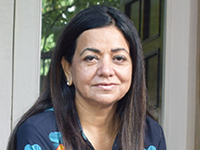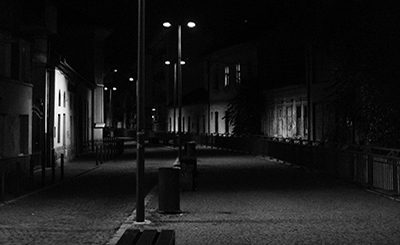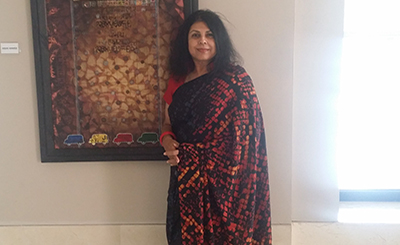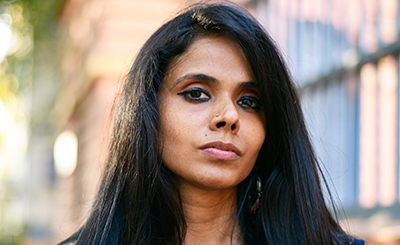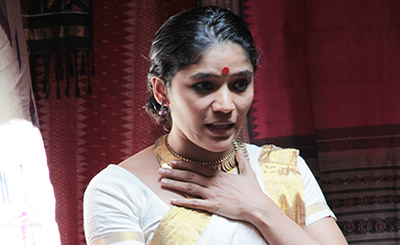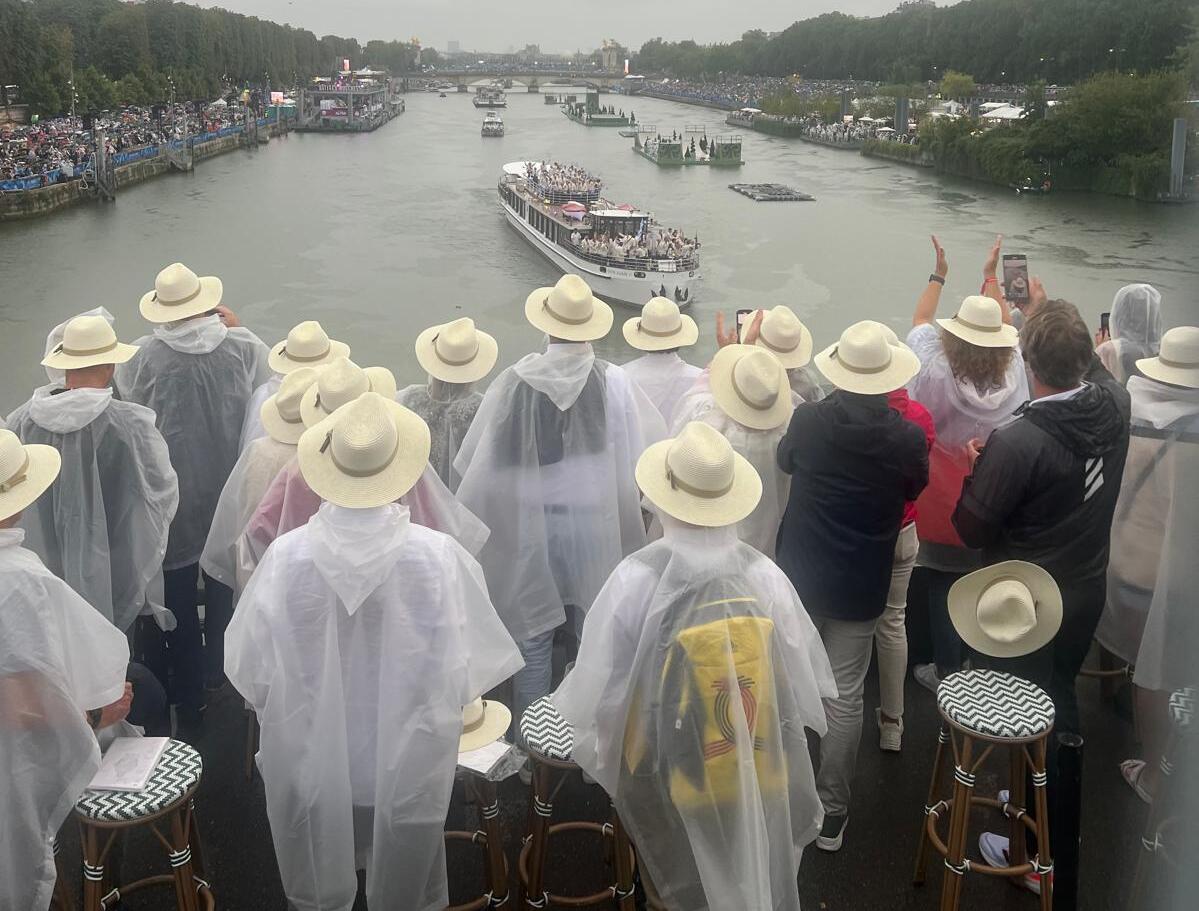
Visitors watching the Paris Olympic Games Opening Ceremony in the rain. Photos: Surina Narula
The use of recycled materials, energy-efficient lighting, and messages promoting environmental conservation struck a chord with environmentally conscious audiences across the political spectrum
We reached Paris two days before the Olympics, anticipating a lot of hurdles due to the tight security. Navigating the area required passes and permits. On the day of the opening ceremony, we prepared for all possible weather conditions — cold, heat, and a bit of rain. We walked a lot before finally finding a cab that could take us close to the venue where we had bought our tickets. We had spent a bit extra to be on a bridge, and arriving early was crucial to securing good seats. By 5 pm, the stands were already full with people who had arrived an hour earlier.
We sat next to a family from Mexico, and the hospitality of food and drinks was exceptional. There was no shortage of anything. The arrangements were smooth until it started raining heavily. Despite being given plastic ponchos, we got soaked. Yet, the opening ceremony of the latest Olympic Games in Paris was a spectacle of grandeur, innovation, and profound symbolism. As I stood among the diverse crowd, I met people from many countries. I felt an overwhelming sense of unity that transcended political divides, resonating deeply with both the left and the right.
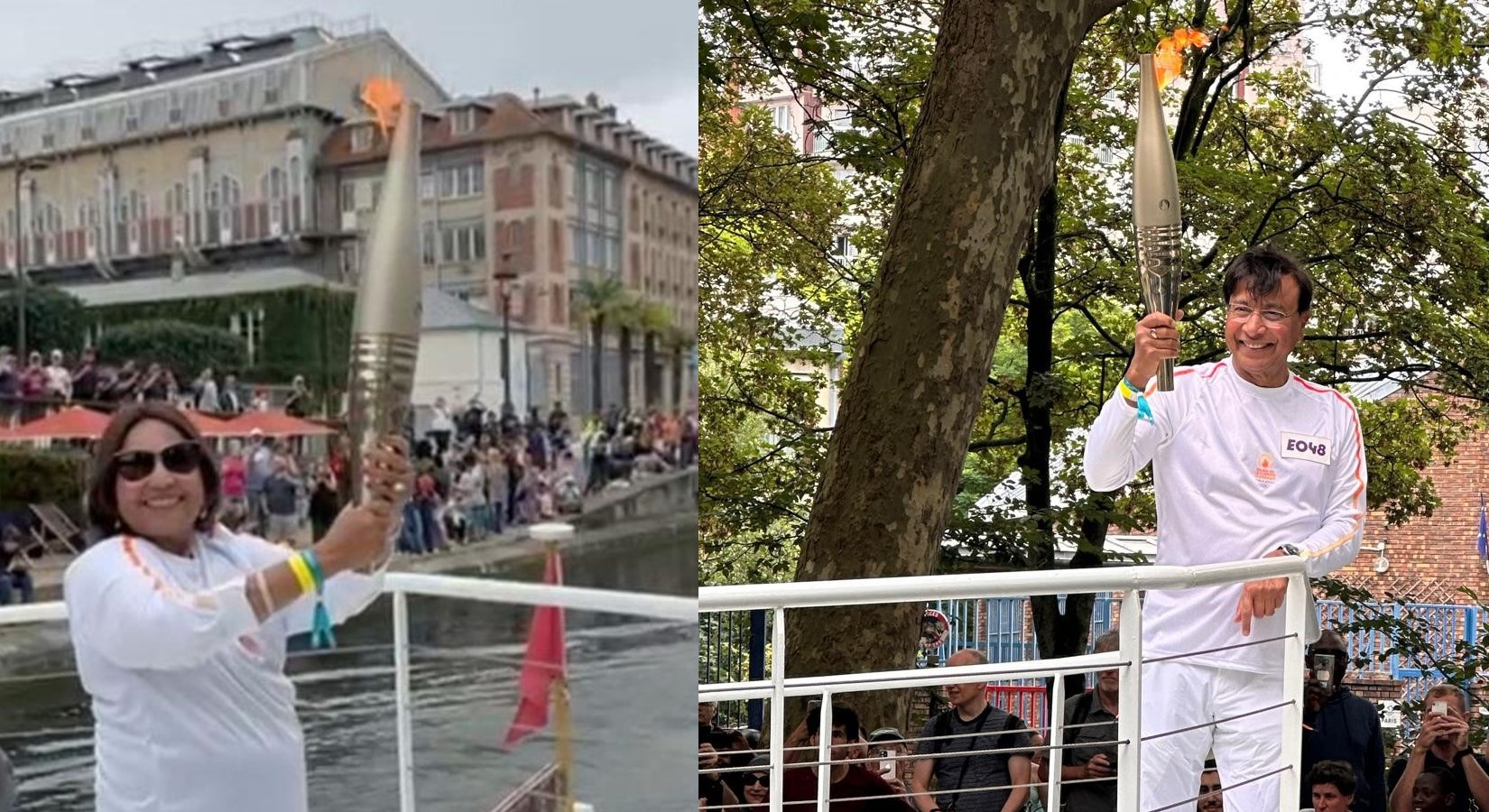
Usha Mittal and LN Mittal carrying the Olympic torch at the Opening Ceremony
One of my favourite aspects of the ceremony was its emphasis on environmental sustainability and social responsibility. The use of recycled materials, energy-efficient lighting, and messages promoting environmental conservation struck a chord with environmentally conscious audiences across the political spectrum. I also felt good that they had not built new stadiums and had done the ceremony all over the city. Highlighting women who had contributed towards feminism was an amazing sight. I didn’t know that so many women had actually given their lives to give us what we have today. Freedom to pursue any courses we want, freedom to become who we want; I feel so special being a woman today. Thanks to those who fought for us.
There was a French lady standing next to me who said, “From beauty to ugliness, I am shocked by the vulgarity of some sequences; only the lighting and the boats and the flying horse and, of course, Celine Dion, but most of the chorégraphie is shocking. I am missing the old days.” Sadly, she didn’t get the point.
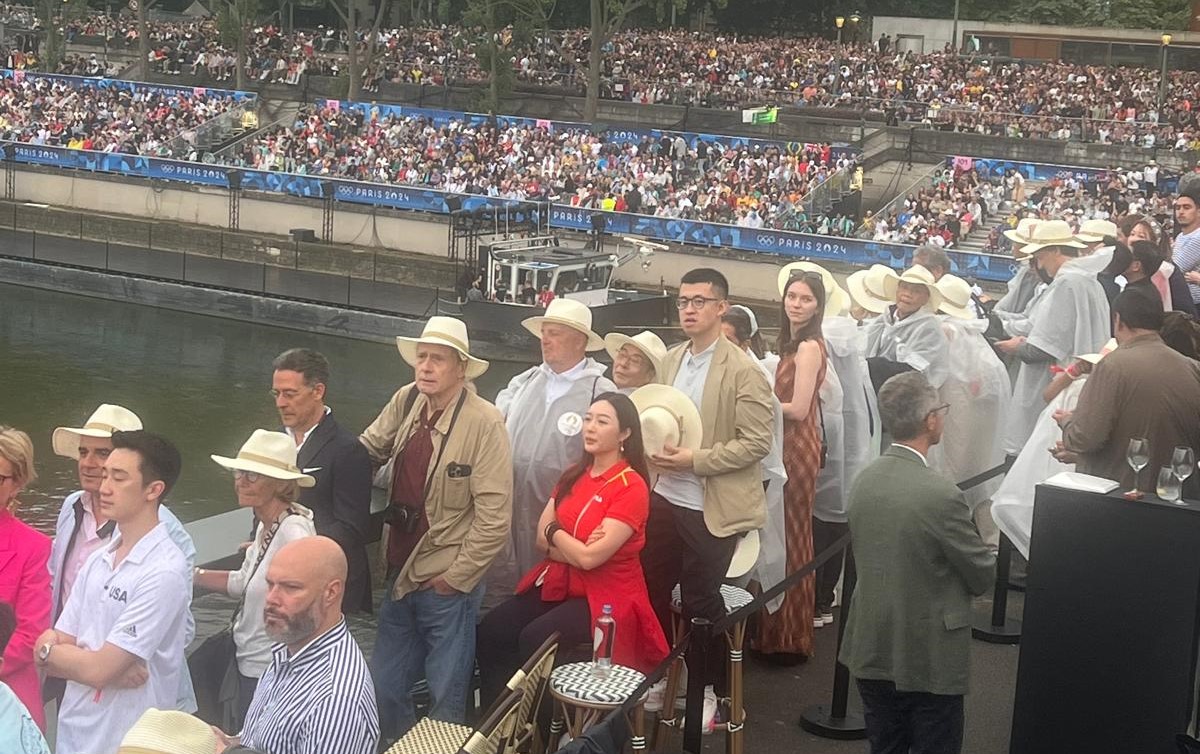
People lining up on the bridge at the Opening Ceremony.
From the outset, the ceremony was designed to reflect universal values that cut across political ideologies. The theme of unity and cooperation was evident in the choice of performances, the diversity of participants, and the overarching message of global solidarity. Spectators were treated to a blend of traditional and contemporary performances, showcasing a respect for cultural heritage while embracing modernity and progress.
One of the most striking elements of the ceremony was its commitment to inclusivity and representation. A particularly proud moment for those of Indian background, including myself, was when the Mittal family carried the Olympic flame. Performers from various ethnic backgrounds, genders, and abilities took center stage, embodying the Olympic spirit of equality and fair play. This focus on inclusivity resonated with progressive audiences, highlighting the importance of diversity and the need to address social inequalities.
Simultaneously, the ceremony did not shy away from expressions of national pride. Each participating country was celebrated, with their athletes proudly marching under their national flags. This celebration of national identities appealed to more conservative spectators, who value tradition, national pride, and sovereignty. The balancing act of celebrating individual nations while promoting a message of global unity was masterfully executed, creating a shared moment of pride and joy.
.jpg)
Standing in solidarity with African women
Political leaders from both sides of the spectrum lauded the ceremony for its ability to bring people together. Progressive leaders praised the inclusivity and focus on social justice, while conservative figures appreciated the celebration of national pride and the display of discipline and excellence by the athletes. The broad approval underscored the ceremony’s success in crafting a message that resonated universally.
The day before, I had the chance to visit the Africa tent at Africa Station in L'Île-Saint-Denis. There, I met an African lady who expressed her disappointment that they were not given a space in Paris itself to showcase, feeling marginalised as a result. Their presence in L'Île-Saint-Denis was a poignant statement about the Sustainable Development Goals. Most African countries were represented there, selling goods from their homelands and making their voices heard on global sustainability issues.
‘When Worlds Collide,’ powered by Let’s Disrupt Digital, KiwiTech, My Global Village, and Africa Station, organized several events there in Paris and surrounding area, during the first days of the Games. This included an Olympics Dinner Gala at City Hall of Saint-Denis, curated by Chef Mick Elysee, and hosted by Mayor of Saint-Denis, Mathieu Hanotin. The programme of events was presented by LiquidAcre, The Frequency of Miracles, Solutions2U, Le Kool Champagne, Austin Fashion Incubator, Or Noir Caviar, and more. Special panels on innovation, wellness, as well as on climate action, which was moderated by Benn Wiebe, also complemented the eclectic programming. The panel discussions took place in an art gallery near the Louvre, perfectly complementing Paris’s beautiful art scene.

Panel discussion on Climate Action on the sidelines
Ultimately, the opening ceremony of the Olympics served as a reminder of the unifying power of sport. It transcended political ideologies by focusing on shared human values: the pursuit of excellence, the spirit of fair competition, and the celebration of our common humanity. In a world often divided by political, social, and economic differences, the ceremony provided a much-needed moment of collective joy and hope.
I encountered a group of young men from Punjab who had traveled all the way to Paris to attend the volleyball match on the 30th — the only Olympic game I could attend. Italy triumphed over Egypt with a decisive victory, their players towering over the net with remarkable skill. The excitement in the stadium was electrifying, and the enthusiasm of the boys from Punjab was palpable. It was heartwarming to witness the global reach and impact of the Olympics, bringing people together from all corners of the world.
The opening ceremony of the Olympic Games was more than just an elaborate show; it was a carefully crafted narrative of unity and solidarity. The world is divided right now. The Indian elections were a statement rejecting the extreme right swing in the last few years. England also demonstrated by choosing Labour as the main party. The swing towards the left is quite apparent. The division in France has led to political unrest for many years and the Olympics, by blending elements that appeal to both the left and the right, demonstrated that there can be cooperation. It was a testament to the idea that, through mutual respect and cooperation, we can build a more inclusive and harmonious world.
More from The Byword
Comments
*Comments will be moderated



